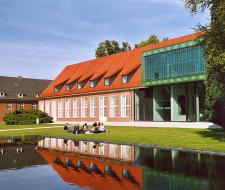Study in Germany. 260 best institutions in Germany
In the process of preparing the material, we referenced the following sources:
- https://www.topuniversities.com/universities/germany?country=[DE]
- https://howtogermany.com/education/german-schools.
-
 In 2022 an average IB score made up 34
In 2022 an average IB score made up 34 GermanyPotsdamCurrently watching: 10from 13500.00 € / yearApply with documents
GermanyPotsdamCurrently watching: 10from 13500.00 € / yearApply with documents -
 In 2021 an average IB score made up 33,4
In 2021 an average IB score made up 33,4 GermanySalemCurrently watching: 10from 42840.00 € / yearApply with documents
GermanySalemCurrently watching: 10from 42840.00 € / yearApply with documents -
 Top-50 best Marketing programs in the world
Top-50 best Marketing programs in the world GermanyMunichCurrently watching: 8from 4900.00 € / semesterApply with documents
GermanyMunichCurrently watching: 8from 4900.00 € / semesterApply with documents -
 from 1250.00 € / 6 weeksApply with documents
from 1250.00 € / 6 weeksApply with documents -
 Top 10 in business studies in Germany
Top 10 in business studies in Germany GermanyBerlinCurrently watching: 8from 10380.00 € / yearApply with documents
GermanyBerlinCurrently watching: 8from 10380.00 € / yearApply with documents -
 26th in Europe per the Full-time MBA
26th in Europe per the Full-time MBA GermanyBerlinCurrently watching: 5from 220.00 € / weekApply with documents
GermanyBerlinCurrently watching: 5from 220.00 € / weekApply with documents -
 95% of graduates are employed
95% of graduates are employed GermanyBerlinCurrently watching: 5from 9000.00 € / yearApply with documents
GermanyBerlinCurrently watching: 5from 9000.00 € / yearApply with documents -
 School is in top 10 best bilingual boarding schools in Germany
School is in top 10 best bilingual boarding schools in Germany GermanyBerlinCurrently watching: 6from 37000.00 € / yearApply with documents
GermanyBerlinCurrently watching: 6from 37000.00 € / yearApply with documents -
 Best Private University among the universities of applied Science 2018
Best Private University among the universities of applied Science 2018 GermanyBonnCurrently watching: 6from 11980.00 € / yearApply with documents
GermanyBonnCurrently watching: 6from 11980.00 € / yearApply with documents -
 ranked #42 in the QS Global MBA Rankings 2022
ranked #42 in the QS Global MBA Rankings 2022 GermanyHannoverCurrently watching: 3from 220.00 € / weekApply with documents
GermanyHannoverCurrently watching: 3from 220.00 € / weekApply with documents
Alternative destinations
Education information
Germany is considered to be one of the most prestigious countries for studying abroad. SMAPSE organizes enrollment of international students in best German schools and universities, selects programs and courses in Germany of different duration, subject and orientation.
Academic traditions in Germany are very different from others, it often causes a significant interest in German schools and universities - the idea of studying in Germany is gaining popularity among foreign students. Today, according to statistics, more than 160,000 students from different countries of the world have chosen their studies in Germany. Due to the list of TOP-100 schools, camps, colleges and universities in Germany, you will definitely find the most appropriate option.

Education in Germany has an interesting distinctive feature: it harmoniously combines the centuries-old university traditions with modern scientific achievements. Studying in Germany attracts foreign students with its prestigious private educational institutions of various levels. Academic preparation in the country is excellent. Actually, studying in Germany may seem complicated, but all difficulties are justified and motivated by deep, thorough preparation of students.
Educational Structure in Germany
The educational system in Germany is organized into three primary levels: initial, secondary, and higher education. Foreign students between the ages of 6 and 16 have the opportunity to study in Germany's schools. The entire duration of school education lasts 13 years, and international students can enroll at any point, except for the graduation year, as long as they meet certain introductory requirements.

Secondary Education in Germany
German education is categorized into various stages. The initial stage typically lasts 4-6 years and focuses on a comprehensive curriculum without breaking it down into specific subjects. Following each academic year, students are assessed to determine their academic progress.
Once students advance to high school, they study basic subjects and have the option to select additional disciplines based on their interests and abilities. For those uncertain about the type and direction of their educational path, Germany offers an orientation level, usually aimed at students in grades 5-6.
Secondary education concludes at age 16. Subsequently, until the age of 19, students attend specialized secondary schools or colleges. Here, they prepare for the Abitur diploma examinations, a prerequisite for university admission.

Higher Education: Best Programs to Study in Germany
Higher education in Germany is divided into two main stages. The first, or basic stage, lasts 3-4 semesters, followed by an additional 4-6 semesters. International students can pursue study abroad in Germany either after completing their college education or through a special program known as Studium.

How to Apply for a Study Permit in Germany

International students must complete a pre-university preparation program, known as Studienkolleg, to be eligible for university admission. This requirement exists due to differences in educational programs between Germany and other countries.
Language Requirements and Courses
Another essential aspect of study in Germany is language proficiency. Students often prepare for the DAF or DSH exams, which assess skills in writing, listening, speaking, and reading. These exams are equivalent to the IELTS in the UK and TOEFL in the US. Special language courses, including those offered at summer schools, help students prepare for these exams at an affordable cost.

Beyond teacher qualifications, what do parents consider when choosing a school?
Parents often look for schools that foster a sense of community and offer opportunities beyond academics. We focus on involving students in extracurricular activities and encouraging artistic pursuits, aiming to develop well-rounded, empathetic individuals prepared for modern challenges.
Benefits of Studying in Germany's Top 100 Schools, Colleges, and Universities
-
Choosing to study in Germany offers multiple advantages:
-
International Career Opportunities: A German diploma is globally recognized, and graduates are highly sought-after in the global job market.
-
Pathway to European Residency: For international students, studying in Germany could be the first step towards obtaining European residency.
-
Practical Focus: The education system's practical orientation allows graduates to enter the workforce without the need for preliminary internships.

Study in Germany Costs and Fees
-
Secondary education in boarding schools: Ranges from €25,000 to €40,000 per year.
-
Holiday camps for children: Cost between €650 and €1,100 per week, excluding flights.
-
Language courses: Generally cost from €150 to €250 per week.
Studying in Germany not only provides a prestigious, convenient, and practical education but is also relatively affordable when compared to other Western countries. Therefore, Germany continues to be an increasingly attractive destination for international students.
General educational statistics in Germany
Studienkolleg Courses by subject
| Course | Topic | Subjects |
|---|---|---|
| TI-Kurs | Technical sciences | Mathematics and Computer science |
| Engineering | Natural sciences | |
| German | ||
| Technical drawing | ||
| WW-Kurs | Business | Mathematics and Computer science |
| Economics | ||
| German | ||
| English | ||
| GD-Kurs | Art | German |
| Design | Mathematics | |
| Design | ||
| Physics | ||
| SW-Kurs | Social science | Mathematics |
| Economics | Pedagogy | |
| German |
Varieties of Studienkolleg Courses
| Course | Topic | Subjects |
|---|---|---|
| T-Kurs) | Technical sciences | Mathematics |
| Natural sciences | ||
| Mathematics | ||
| Physics | ||
| Chemistry | ||
| Computer science | ||
| German | ||
| M-Kurs) | Medicine | Biology |
| Mathematics | ||
| Physics | ||
| Chemistry | ||
| Biology | ||
| German | ||
| W-Kurs) | Social science | Mathematics |
| Economics | Economics | |
| Business | Business | |
| English | ||
| German | ||
| G-Kurs) | Humanities | History |
| Literature | ||
| Political science | ||
| Social science | ||
| German | ||
| S-Kurs | Languages | History |
| Literature | ||
| German | ||
| Social science |
Cost of living in Germany
| Expenses - USD/Month. | Min. | Med. |
|---|---|---|
| Accommodation | 263 | 357 |
| Food | 181 | 362 |
| Transportation | 62 | 197 |
| Communications and utilities | 90 | 137 |
| Clothing | 26 | 97 |
| Sports and leisure | 22 | 93 |
| Total | 644 | 1,243 |
| Accommodation in Germany | USD/Month. | |
| Shared room outside of centre | 266 | |
| Shared room in city centre | 361 | |
| 1 bedroom apartment outside of centre | 412 | |
| 1 bedroom apartment in city centre | 571 |
The list of studienkollegs in Germany
| Studienkolleg | Germany state | Admission | Courses |
|---|---|---|---|
| Studienkolleg Munich | Bavaria | Universities | T, M, W, G |
| Studienkolleg Coburg | Bavaria | Universities of applied sciences | TI, WW, SW |
| Studienkolleg FU Berlin | Berlin | Freie Universität Berlin | T, M, W, G |
| Humboldt Universität zu Berlin | |||
| Charité Universitätsmedizin Berlin | |||
| Studienkolleg KIT | Baden-Württemberg | The Karlsruhe Institute of Technology | T |
| Studienkolleg Hamburg | Hamburg | Universities | T, M, W, G/S |
| Niedersächsisches Studienkolleg | Lower Saxony | Universities | T, M, W, G/S |
| Universities of applied sciences | |||
| Studienkolleg Sachsen | Saxony | Universities | T, M, W, G/S |
| Internationales Studienzentrum | Hesse | Universities | T, M, W, G |
| Internationales Studienkolleg | Rhineland-Palatinate | Universities | T/TI, W/WW |
| Universities of applied sciences | |||
| Hochschule Wismar Studienkolleg | Mecklenburg-West Pomerania | Universities | TI, W /WW |
| Universities of applied sciences |
Requirements for Admission to Studienkollegs
| Studienkolleg | Deadline | Entrance examination | Beginning of study |
|---|---|---|---|
| Studienkolleg München | 15 Jan. | February | 15 Mar. |
| 15 July | September | 1 Oct. | |
| Studienkolleg Coburg | 30 Dec. | February | 15 Mar. |
| 30 June | September | 1 Oct. | |
| Studienkolleg FU Berlin | 15 Jan. | February | 1 Mar. |
| 15 July | August | 3 Sept. | |
| Studienkolleg KIT | 15 Jan. | February | March |
| 15 July | September | October | |
| Studienkolleg Hamburg | 30 Sept. | October | 1 Jan. |
| 31 Mar. | May | 1 Aug. | |
| Niedersächsisches Studienkolleg | 15 Feb. | March | 3 Apr. |
| 15 July | September | 3 Oct. | |
| Studienkolleg Sachsen | 15 Jan. | March | March |
| 15 July | September | September | |
| Internationales Studienzentrum | 15 Apr. | June | August |
| 15 Oct. | January | January | |
| Internationales Studienkolleg | 15 Apr. | June | August |
| 15 Oct. | January | February | |
| Hochschule Wismar Studienkolleg | 15 June | August | September |
| 30 Nov. | February | February/March |
Statistics of English courses in Germany
| Programs | Intensity | Group | Language requirements | The minimum cost of the week |
|---|---|---|---|---|
| General German | 15-20 | 8-10 | Starter | €240+ |
| Intensive German Course | 28-30 | 5-15 | Starter | €250+ |
| Crash Course | 35-40 | 5-15 | Starter | €490+ |
| Exam Preparation Courses | 20-25 | 8-15 | Upper Intermediate | €270+ |
| German for Work | 20-25 | 7-10 | Intermediate | €270+ |
| Study & Live in your Teacher's Home | 20-30 | 1 | Starter | €1,450+ |
| German + University | 25-30 | 8-12 | Beginner | €295+ |
| Part-Time Courses | 4-15 | 8-10 | Starter-Beginner | €60+ |
| One-to-One lessons | individual | 1 | Starter | €60+ (1 lesson) |
Students Accommodation Options in Germany
| Accomondation | Meals | Number of people per room | Cost per week/min | Cost per week/max |
|---|---|---|---|---|
| Homestay | full Board or half Board | 1-2 | €180 | €350 |
| School residence | full Board | 1-2 | €190 | €300 |
| Appartment | without meals | 1-3 | €180 | €750 |
| Hotel | with/out meals | 1-2 | €30/day | €150/day |
Foundation - General statistics
| Country | Min cost | Max cost | Accommodation per year |
|---|---|---|---|
| UK | 15,000 USD | 35,000 USD | ~ 14,750 USD |
| Ireland | 12,000 USD | 30,000 USD | ~ 12,000 USD |
| USA | 25,000 USD | 45,000 USD | ~ 14,500 USD |
| Canada | 15,000 USD | 35,000 USD | ~ 12,000 USD |
| Australia | 15,000 USD | 25,000 USD | ~ 13,500 USD |
| Germany | 2000 USD | 25,000 USD | ~ 10,400 USD |



